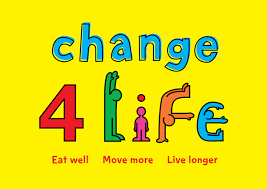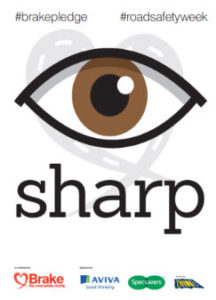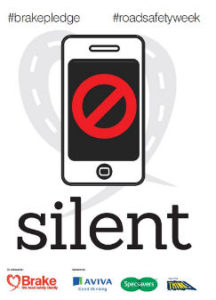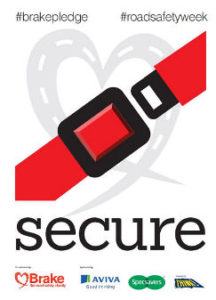Everyone – I’ll minimise the amount I drive, or not drive at all. I’ll get about by walking, cycling or public transport as much as I can, for road safety, the environment and my health.
Driver advice: sustainable
#brakepledge
#roadsafetyweek
Why go eco?
By choosing sustainable travel, we can all help to reduce the road safety, public health, environmental and economic costs to society of our over-reliance on cars. Fewer cars on the road mean fewer road deaths and injuries, less congestion, less emissions and more pleasant, sociable communities.
Whether it’s doing the school run on foot or bike, walking to the local shop instead of driving to the supermarket, or taking public transport to work instead of driving, incorporating active and sustainable travel into your routine can be really simple, and it’s a great way to stay active, save money, and do your bit for the environment.
Do you need to drive?

Two-thirds (64%) of all UK journeys and 40% of journeys less than two miles are made by car, many of which could be made on foot or bike, or by public transport. While each trip may not seem like much, it all adds up to a lot of unnecessary car use.
For each journey you make by car, ask yourself if there’s a more sustainable and healthy option. If it’s a short journey, could you walk or cycle? You can use Sustrans’ website to explore walking and cycling routes in your area and work out the safest, most pleasant way to get to your destination on foot or bike. Get into the habit of leaving the car at home for these shorter journeys and you’ll spend less money on petrol and feel healthier for the exercise – plus you’ll be helping to make your area a nicer, less polluted place.
For longer journeys could you take a bus, train or coach instead? If you book in advance, the cost of tickets can often work out cheaper than what you’d spend on petrol and you can sit back and relax without the stress of driving. You can look up public transport options by region at www.traveline.info/.
Commuting
If you drive to and from work, there’s a good chance you’ll be able to switch to a sustainable commute, which may be quicker, cheaper, healthier and less stressful. Research shows that people who commute by walking and cycling better able to concentrate and are less stressed. Look online at your local travel information to see what sustainable transport options you have, including bus routes, train services and safe cycle paths.
If you want to cycle to work but don’t own a bike, find out if your employer participates in the government’s Cycle to Work initiative, which allows you to purchase a new bike (and related equipment like cycle paths) tax-free, and pay monthly straight from your salary. If they aren’t signed up to the scheme, direct a relevant member of staff to details of the benefits to employers and encourage them to sign up. Read Brake’s advice on cycling.
Safe cycling

Cycling is healthy, low-cost and environmentally friendly way to travel. Go to Brake’s cycling advice pages for further information on how to keep safe while cycling.
If you have to drive
If there are journeys that you have to make by car, there are some simple steps you can take to minimise the negative impacts of this on you and the people around you:
- Make the Brake Pledge, a simple six point pledge to help keep you and others safe on the road and prevent needless tragedies.
- Keep to a lower speed and avoid harsh braking and acceleration to produce fewer emissions and improve fuel efficiency. In particular, slow down to 20mph or below in built up areas, even where the speed limit is 30. It’s unlikely to affect your journey time significantly, but it will mean your car is less polluting because there is less speeding up and slowing down, and it will mean you’re helping to make roads safer for people on foot and bike. See our advice on speed.
- The same principle applies on faster roads. For each 5mph you drive over 60mph, you use 7% more fuel. Slower is not only safer, but it’s better for the environment and will save you money on petrol
- Plan your journeys more efficiently. If you have a number of errands to do or journeys to make, can they be combined into the same trip? Make sure you still allow plenty of time for driving at safe, slow speeds, possible hold-ups, and breaks every two hours.
- Make sure your vehicle is properly maintained. A well maintained vehicle produces fewer emissions and is more fuel efficient. Simple things like keeping your tyres well inflated, cleaning or replacing dirty air and fuel filters, and regularly changing your oil can improve fuel efficiency. Read our advice on vehicle maintenance.
Brake driver advice: sustainable
www.brake.org.uk/schools-communities/make-the-brake-pledge/27-whats-happening/1285-driver-advice-sustainable
 Everything you love about Stagecoachbus.com – in your pocket.
Everything you love about Stagecoachbus.com – in your pocket.



 In this this fourth post on preparing for winter we have information from Brake on winter driving.
In this this fourth post on preparing for winter we have information from Brake on winter driving. Barriers being installed on the approach road to the the Eurostar terminal entrance at Ashford International Station are to be used as part of a new parking management system. The registration of all cars entering the station will be read by cameras. If a car is in the station for more than 20 minutes the exit barrier will not be lifted unless a parking fee has been paid at a machine in the Eurostar terminal building.
Barriers being installed on the approach road to the the Eurostar terminal entrance at Ashford International Station are to be used as part of a new parking management system. The registration of all cars entering the station will be read by cameras. If a car is in the station for more than 20 minutes the exit barrier will not be lifted unless a parking fee has been paid at a machine in the Eurostar terminal building.





